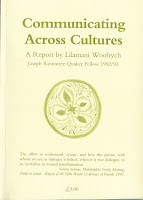 |
| W.C. Braithwaite |
William Charles Braithwaite was born in Camden, London on 23 December 1862, eighth of the nine children of
Joseph Bevan Braithwaite and Martha Gillett. He was a pretty child, 'very fair, with a captivating smile, his golden hair arranged in one long curl on the top of his head', and was doted on by his older sisters. He showed an early love of books and learned to read when he was three.
William was brought up in a close, contented Quaker family but had little contact with others of his own age. Both his parents travelled in the ministry and were often away from home, but their absences were accepted as normal. William grew particularly close to his father with whom he shared a love of study.
William was educated at home until he was eleven when he was sent away to Quaker schools, first in Weston-super-Mare and then in Scarboroough. Leaving school at seventeen, William went to University College London, graduating in 1881. He was active in sport but also in the Bunhill Adult School and the Friends Christian Fellowship Union.
 |
| J.B. Braithwate, William's father |
William next turned his attention to the law, studying mostly at home or in his father's chambers. After qualifying in 1887 William lived at home and worked for ten years with his father in his conveyancing practice at Lincoln's Inn, a happy arrangement for them both. William explored London, studied, wrote poetry and did peace work with his uncle and neighbour, George Gillett.
His friend George Newman, who met him at this time, says he was 'a reserved, imperturbable man, of quiet but exceptional power...He never failed you. He was circumspect, seeing all sides and sympathizing with many...possessing a delightful sense of humour and a well-developed faculty of imagination.'
William's life changed in 1896 when he became engaged to Janet Morland and accepted the offer of a partnership in Gillett's Bank in Banbury, Oxfordshire. He had to give up the legal profession and move away from home, but banking gave him a more settled income and more leisure for study and for his work with the Society of Friends.
 |
| Banbury Quaker Meeting House in 1910s |
He settled happily in Banbury with Janet and the couple had four children, three boys and a girl. There was a shift in attitude towards family life from one generation to another. William's father had encouraged his children to join him in his study, but had expected them to do so in absolute quiet. In contrast it was a source of wonder to William's friends how he could calmly collate an ancient manuscript or prepare an Adult School lesson while his small children played around the room, asking questions and demanding his help in their games.
As well as his other interests William became involved in public life in Banbury. He was a magistrate from 1906 until his death and chairman of the Education Committee for many years. He was also very involved with the local Quaker school, Sibford.
 |
| John Wilhelm Rowntree |
William was much influenced by his friendship with John Wilhelm Rowntree who he had met at Yearly Meeting 1893. They shared a belief in the need for education for Friends and for strengthening the Society and developing its ministry. One of John Wilhelm's projects was the writing of a standard history of Quakerism and he had begun collecting thousands of books and pamphlets for the necessary research when he died suddenly and unexpectedly in 1905. William took up the project and worked on it in his leisure time for the next fourteen years. He sometimes became so absorbed in the work 'that he seemed to be living in the seventeenth century, far removed from the events that were passing around him.'
The Beginnings of Quakerism and
The Second Period of Quakerism were completed in 1919 and have not yet been surpassed.
At the beginning of 1922 several of William's long-term projects were nearing completion. The histories had been finished eighteen months earlier, the new Yearly Meeting Book of Discipline, which William was much concerned with compiling, had been agreed and Gilletts Bank had been amalgamated with Barclays after negotiations in which William had taken a major role.
In the last week of January William ministered at Banbury Meeting, took a leading part in a conference on Ministry in Oxford, began a series of Adult School evening talks and worked in the bank. On Friday he felt unwell but went to London by the early train to attend an educational meeting. He became much worse and only just managed to get to Paddington and onto the train home. He arrived in Banbury in a state of collapse, sank into a diabetic coma and died the next day, 28 January 1922, aged fifty nine.












